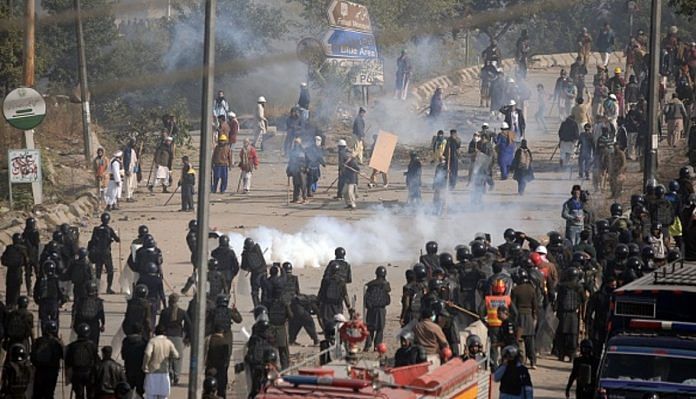The Army’s rapidly amassing power shows that democracy in Pakistan—which has scored major successes over nine consecutive years of civilian rule—is imperiled once again.
Anyone who’s visited Islamabad, Pakistan’s capital city, knows it’s usually a perfectly placid place.
Sometimes, however, the country’s cauldron of political volatility and religious extremism transforms the tranquil metropolis into a bloody battleground.
And often enough, regardless of the players involved, it’s the all-powerful military that emerges with the upper hand.
Indeed, in the aftermath of yesterday’s crackdown on protestors occupying a major city interchange, the military once again finds itself in the catbird seat.
The protestors belong to religious political parties calling for the ouster of Pakistan’s law minister, who they fault for changing the wording of an oath— uttered by Pakistani electoral candidates—about Muhammad being the final prophet. The movement is led by Tehreek-e-Labaik Ya Rasool Allah (TLY), a group that lionizes Mumtaz Qadri, a man who assassinated the governor of Punjab province in 2011 for opposing Pakistan’s blasphemy laws. TLY leader Khadim Hussain Rizvi routinely heaps abuse on religious minorities. TLY’s rallying cry is “death to blasphemers.” These are dangerous people spouting dangerous views.
The protestors had caused big headaches for a beleaguered government hammered by corruption allegations and repeatedly cut down to size ever since another anti-government movement, led by opposition leader Imran Khan, hit Islamabad in 2014. This past summer, Prime Minister Nawaz Sharif was disqualified from office by the Supreme Court. Some of his supporters suggested the Army helped the judiciary engineer a soft coup.
Recent months have seen the military repeatedly and publicly assert itself against an increasingly vulnerable government. This fall, Army spokesman Gen. Asif Ghafoor used a press conference to weigh in on economic policy—an area where even an overreaching army has typically deferred to the civilians. Even more dramatically, Pakistani Interior Minister Ahsan Iqbal was physically prevented from entering a courthouse holding a corruption hearing for Sharif. He was blocked by the Rangers—a paramilitary force theoretically under Iqbal’s command.
How unsurprising, then, that soon after the government commenced its crackdown yesterday, Gen. Ghafoor tweeted that Pakistan’s Army chief, Qamar Javed Bajwa, had called Prime Minister Shahid Khaqan Abbasi and “suggested” Abbasi “handle the Dharna peacefully.”
Unfortunately, it didn’t go well for Islamabad. The government took the dramatic step of suspending television programming and banning social media platforms, but the media blackout didn’t help civilian security officials get the protestors off the street. Even armed with tear gas and rubber bullets, the police eventually had to go on the retreat as more protestors poured onto protest sites.
Predictably, as Saturday drew to a close, the government suspended its operation—
and asked the military to send in troops to help disperse the protestors.
As of this writing, the outcome of the crackdown was unclear. But this much is clear: No matter the outcome, the military is the winner.
The Army may not have stage-managed the protest, but it certainly derives major benefits from it—and its aftermath. The religious hardliners succeeded in doing what the Army frequently seeks to do—put pressure on the civilians and make them look vulnerable. For several weeks, a small band of extremists practically held the capital hostage with a strategically located sit-in. The government could only look on, until it finally acted, only to botch the response and defer—as it so often does—to the military.
A big takeaway from the Army’s rapidly amassing power is that democracy in Pakistan—which has scored major successes over nine consecutive years of civilian rule—is imperiled.
To be sure, Pakistan is a more democratic place today than it was decades ago. In previous eras, the troops would have been called in much sooner—or, more accurately, the troops would have called themselves in much sooner. Still, today, Pakistan’s democracy is, at the very least, highly fragile.
Even more troubling than the blows to democracy, however, is the clout of Pakistan’s religious hardliners. They don’t perform well at the ballot box, but they have a marvelous ability to mobilize and galvanize. They likely owe their clout, and the impunity they enjoy, at least in part to support from the country’s preeminent power broker—the security establishment.
The sobering reality is that a group of religious hardliners, despite being relatively small in number, managed to set up shop unencumbered in the nation’s capital for 17 days. Of course, this is a nation where actual militants—including Hafiz Saeed, the leader of Lashkar-e-Taiba freed from house arrest several days ago—periodically make public appearances across the country.
TLY and its ilk are not terrorists, but they espouse the types of ideologies that inspire terrorists. The fact that they enjoyed free rein on an Islamabad interchange for more than two weeks is great cause for concern—not just for the calm city they convulsed, but for the stability of the nation on the whole.
Michael Kugelman is deputy director of the Asia Program and senior associate for South Asia at the Woodrow Wilson International Center for Scholars in Washington, DC. Twitter @michaelkugelman; email: michael.kugelman@wilsoncenter.org



